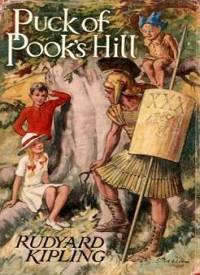is a historical fantasy book by Rudyard Kipling, published in 1906, containing a series of short stories set in different periods of English history. The stories are all told to two children living near Pevensey by people magically plucked out of history by elf Puck, or by Puck himself.
Enchanted by the theatre, Dan and Una decide to recreate their own version of A Midsummer Night's Dream. Finding the perfect spot, an old fairy ring, they set about their play, and are so enchanted that they perform it three times in a row.
After a final bow, they sit down in the centre of the fairy ring - whereupon, the bushes part and Puck enters, stage left. Puck, who refers to himself as "the oldest thing in England", uses his fairy magic, and conjures up the past to entertain the two amazed children - a Roman centurion, a Renaissance artisan and a bygone village all appear before their very eyes.
Puck of Pook's Hill is an innocent and charming tale to delight readers of all ages. Kipling writes some wonderful prose in this compact book. He evokes the lush Sussex countryside as experienced by healthy, active, and curious children.



